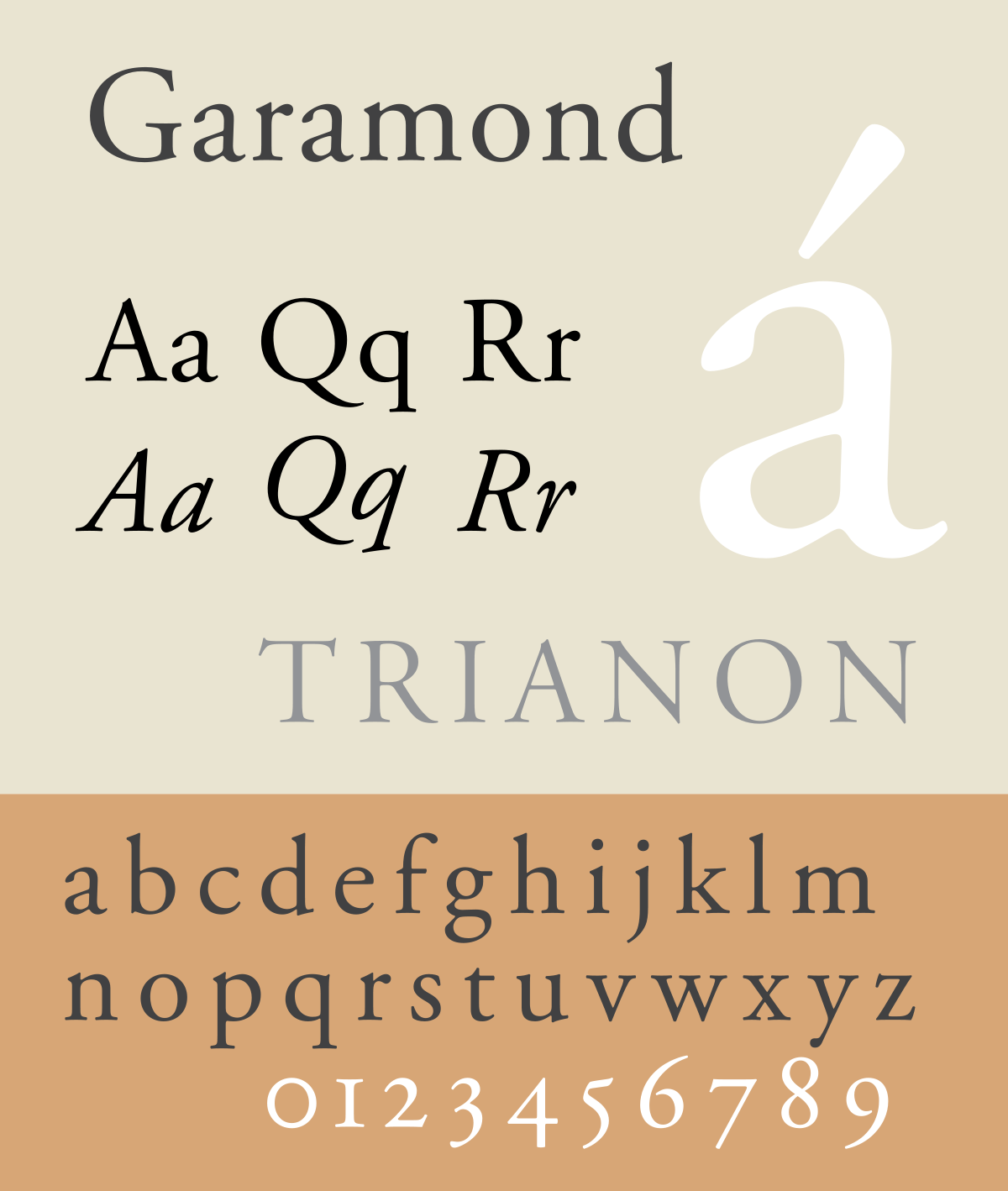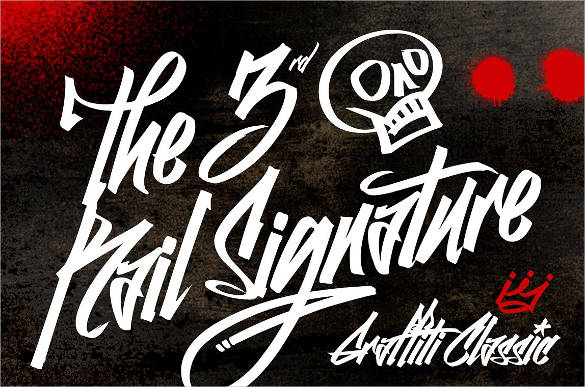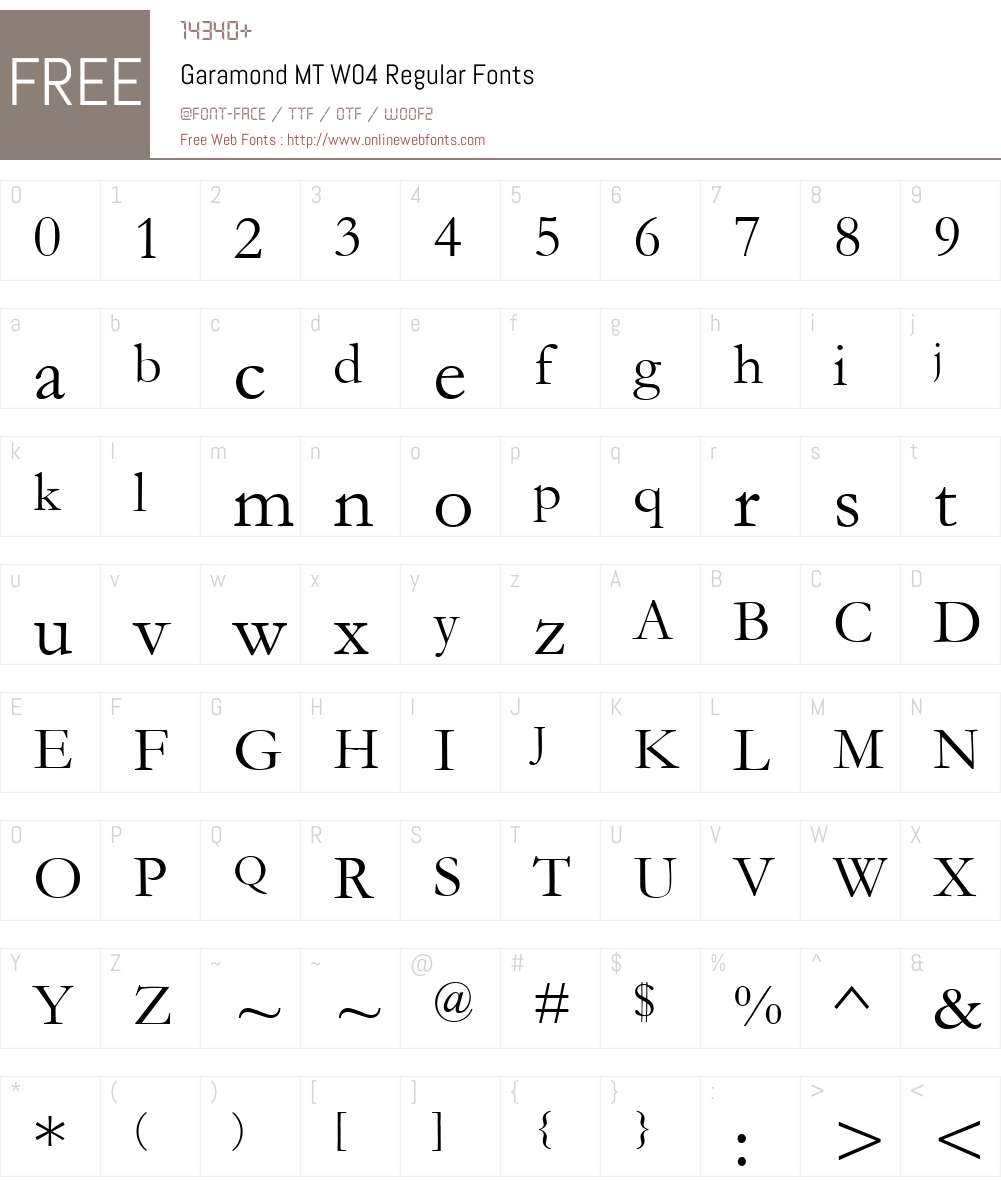

- GaramondStyle
Regular
CompanyMonotype Typography, Inc.
TrademarkMonotype Garamond is a trademark of Monotype Typography, Ltd which may be registered in certain jurisdictions.
CopyrightDigitized data copyright Monotype Typography, Ltd 1991-1995. All rights reserved. Monotype Garamond is a trademark of Monotype Typography, Ltd which may be registered in certain jurisdictions.
DescriptionMonotype Drawing Office 1922. This typeface is based on roman types cut by Jean Jannon in 1615. Jannon followed the designs of Claude Garamond which had been cut in the previous century. Garamond's types were, in turn, based on those used by Aldus Manutius in 1495 and cut by Francesco Griffo. The italic is based on types cut in France circa 1557 by Robert Granjon. Garamond is a beautiful typeface with an air of informality which looks good in a wide range of applications. It works particularly well in books and lengthy text settings.
LicenseNOTIFICATION OF LICENSE AGREEMENTThis typeface is the property of Monotype Typography and its use by you is covered under the terms of a license agreement. You have obtained this typeface software either directly from Monotype or together with software distributed by one of Monotype s licensees.This software is a valuable asset of Monotype. Unless you have entered into a specific license agreement granting you additional rights, your use of this software is limited to your workstation for your own publishing use. You may not copy or distribute this software.If you have any question concerning your rights you should review the license agreement you received with the software or contact Monotype for a copy of the license agreement.Monotype can be contacted at:USA 847-718-0400 UK 44(0)1737 765959For license terms and usage rights, please visit our web site at www.monotype.com/html/type/license.html Lizenzbedingungen und Nutzungsrechte finden Sie auf unserer Webseite www.monotype.com/html/type/license.htmlPour plus d'informations concernant les droits d'utilisation et les questions contractuelles, veuillez consultez notre site www.monotype.com/html/type/license.htmlPara obtener informacin acerca de los trminos de licencia y los derechos de uso, visite nuestro sitio en el Web en www.monotype.com/html/type/license.htmlPer le condizioni contrattuali ed i diritti d'uso, visitate il nostro sito web all'indirizzo www.monotype.com/html/type/license.html
RegularClaude Garamond - StempelStyle
Regular
TrademarkDJ ZAI 2011 zai.tomasz.skowronski@gmail.com All rights reserved.
CopyrightDJ ZAI 2011 zai.tomasz.skowronski@gmail.com All rights reserved.
RegularClaude Garamond - Stempel Garamond W04 BoldStyle
Bold
CompanyLinotype GmbH
TrademarkStempel Garamond is a trademark of Linotype GmbH and may be registered in certain jurisdictions.
CopyrightCopyright 1981 - 2011 Linotype GmbH, www.linotype.com. All rights reserved. This font software may not be reproduced, modified, disclosed or transferred without the express written approval of Linotype GmbH. Stempel Garamond is a trademark of Linotype GmbH and may be registered in certain jurisdictions. This typeface is original artwork of D. Stempel AG. The design may be protected in certain jurisdictions.1988, 1993, 1995, 1998, 2002 Adobe Systems Incorporated. All rights reserved.
DescriptionClaude Garamond (ca. 1480-1561) cut types for the Parisian scholar-printer Robert Estienne in the first part of the sixteenth century, basing his romans on the types cut by Francesco Griffo for Venetian printer Aldus Manutius in 1495. Garamond refined his romans in later versions, adding his own concepts as he developed his skills as a punchcutter. After his death in 1561, the Garamond punches made their way to the printing office of Christoph Plantin in Antwerp, where they were used by Plantin for many decades, and still exist in the Plantin-Moretus museum. Other Garamond punches went to the Frankfurt foundry of Egenolff-Berner, who issued a specimen in 1592 that became an important source of information about the Garamond types for later scholars and designers. In 1621, sixty years after Garamond's death, the French printer Jean Jannon (1580-1635) issued a specimen of typefaces that had some characteristics similar to the Garamond designs, though his letters were more asymmetrical and irregular in slope and axis. Jannon's types disappeared from use for about two hundred years, but were re-discovered in the French national printing office in 1825, when they were wrongly attributed to Claude Garamond. Their true origin was not to be revealed until the 1927 research of Beatrice Warde. In the early 1900s, Jannon's types were used to print a history of printing in France, which brought new attention to French typography and the Garamond types. This sparked the beginning of modern revivals; some based on the mistaken model from Jannon's types, and others on the original Garamond types. Italics for Garamond fonts have sometimes been based on those cut by Robert Granjon (1513-1589), who worked for Plantin and whose types are also on the Egenolff-Berner specimen. Linotype has several versions of the Garamond typefaces. Though they vary in design and model of origin, they are all considered to be distinctive representations of French Renaissance style; easily recognizable by their elegance and readability. First released by D. Stempel AG in 1925, Stempel Garamond was based on the Egenolff-Berner specimen of 1592 and was therefore a revival of the genuine Garamond types. It is one of the most famous Garamond interpretations, and since its introduction in 1925, it has been one of the most frequently used text fonts. Stempel Garamond has its own unique temperament, with a rhythm and sharpness that set it apart from other Garamonds. Stempel Garamond is available in several weights with small caps, Old style Figures, and Central European characters.
BoldD. Stempel AG - Stempel Garamond W04 RomanStyle
Roman
CompanyLinotype GmbH
TrademarkStempel Garamond is a trademark of Linotype GmbH and may be registered in certain jurisdictions.
CopyrightCopyright 1981 - 2011 Linotype GmbH, www.linotype.com. All rights reserved. This font software may not be reproduced, modified, disclosed or transferred without the express written approval of Linotype GmbH. Stempel Garamond is a trademark of Linotype GmbH and may be registered in certain jurisdictions. This typeface is original artwork of D. Stempel AG. The design may be protected in certain jurisdictions.1988, 1993, 1995, 1998, 2002 Adobe Systems Incorporated. All rights reserved.
DescriptionClaude Garamond (ca. 1480-1561) cut types for the Parisian scholar-printer Robert Estienne in the first part of the sixteenth century, basing his romans on the types cut by Francesco Griffo for Venetian printer Aldus Manutius in 1495. Garamond refined his romans in later versions, adding his own concepts as he developed his skills as a punchcutter. After his death in 1561, the Garamond punches made their way to the printing office of Christoph Plantin in Antwerp, where they were used by Plantin for many decades, and still exist in the Plantin-Moretus museum. Other Garamond punches went to the Frankfurt foundry of Egenolff-Berner, who issued a specimen in 1592 that became an important source of information about the Garamond types for later scholars and designers. In 1621, sixty years after Garamond's death, the French printer Jean Jannon (1580-1635) issued a specimen of typefaces that had some characteristics similar to the Garamond designs, though his letters were more asymmetrical and irregular in slope and axis. Jannon's types disappeared from use for about two hundred years, but were re-discovered in the French national printing office in 1825, when they were wrongly attributed to Claude Garamond. Their true origin was not to be revealed until the 1927 research of Beatrice Warde. In the early 1900s, Jannon's types were used to print a history of printing in France, which brought new attention to French typography and the Garamond types. This sparked the beginning of modern revivals; some based on the mistaken model from Jannon's types, and others on the original Garamond types. Italics for Garamond fonts have sometimes been based on those cut by Robert Granjon (1513-1589), who worked for Plantin and whose types are also on the Egenolff-Berner specimen. Linotype has several versions of the Garamond typefaces. Though they vary in design and model of origin, they are all considered to be distinctive representations of French Renaissance style; easily recognizable by their elegance and readability. First released by D. Stempel AG in 1925, Stempel Garamond was based on the Egenolff-Berner specimen of 1592 and was therefore a revival of the genuine Garamond types. It is one of the most famous Garamond interpretations, and since its introduction in 1925, it has been one of the most frequently used text fonts. Stempel Garamond has its own unique temperament, with a rhythm and sharpness that set it apart from other Garamonds. Stempel Garamond is available in several weights with small caps, Old style Figures, and Central European characters.
RomanD. Stempel AG
Mar 17, 2021 The Garamond font has been around for centuries. The original typeface was created in the 1500s by French engraver Claude Garamond. It is described as an 'old-style serif' font, inspired by Roman. The design of the Garamond Font will provide a modern appearance with a retro and vintage style for your creative ideas. This serif font will look its best in gaming- or sports-themed projects. Adobe Garamond™ is a quirky serif font with a textured appearance. This font is slightly condensed and perfect for branding, titles, display headlines.

Garamond Font Sample

Garamond Font Svg
- Stupefaction V1
- achille nzodaStyle : Regular
- P22 Victorian W00 GothicStyle : Regular
- Quire Sans W01 ThinStyle : Regular
- Berylium bold V2Style : bold
- Velveteen Round NF W01 RegularStyle : Regular
- Ubuntu Light ItalicStyle : Light Italic
- LTC Goudy Oldstyle W01 BoldStyle : Regular
- logoskateStyle : Regular